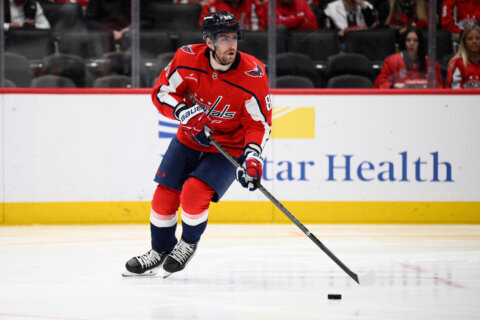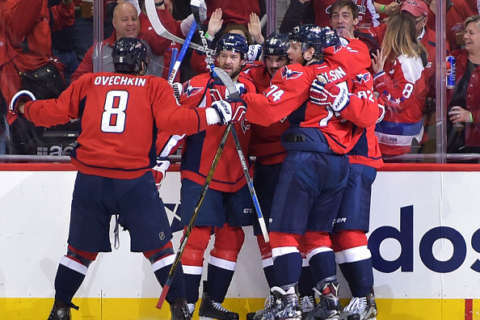WASHINGTON — Overtime hasn’t been kind the Washington Capitals this spring. On Sunday at Capital One Arena, the Columbus Blue Jackets rallied from two goals down and beat the Capitals 5-4 in OT in Game 2 of their first-round series.
The win gave Columbus 2-0 series lead with both of their victories coming beyond regulation. But as the Capitals look to erase a two-game series deficit, we are reminded that today marks the 30th anniversary of one of the greatest comebacks in Capitals history.
On April 16, 1988, the Capitals came back from 3-0 down and beat the Philadelphia Flyers 5-4 in overtime in Game 7 of the Patrick Division Semifinals. Dale Hunter netted the OT winner as the Capitals also completed a comeback within the series itself, which they had trailed 3-games-to-1.
Below is an excerpt from the book 100 Things Capitals Should Know and Do Before They Die, highlighting Hunter’s game winner, which remains one of the greatest goals in franchise history.
HUNTER’S OVERTIME WINNER CAPS OFF TREMENDOUS COMEBACK
By the late 1980s the Capitals had emerged as a perennial Stanley Cup contender. From the 1982-83 season through 1987-88, only the Edmonton Oilers and Philadelphia Flyers had a better cumulative regular-season record than Washington.
The Oilers won the Stanley Cup four times over that stretch, while the Flyers twice reached the Cup Finals. The Capitals, though, were developing a reputation for their playoff shortcomings.
In 1985, Washington blew a 2-0 series lead in the best-of-five Patrick Division semifinal against the New York Islanders. One year later, the first 50-win team in Capitals history let a 2-1 second-round series lead slip away against the New York Rangers.
Nothing compared, though, to the 1987 collapse against the Islanders. With the NHL adopting a best-of-seven format for the divisional semifinals, the Capitals watched a 3-1 series lead evolve into a seven-game defeat. The season ended in devastating fashion with Washington losing Game 7 at home in quadruple overtime in a game that would become known as the Easter Epic. It was heartbreak for the franchise and its increasingly-suffering fan base.
“From my perspective, we seemed to be so unlucky in the playoffs,” former general manager David Poile said in 2017. “So many things seemed to happen that didn’t go our way and I think that was certainly beginning to ware on the franchise, the fans and our ownership.”
Players who had been through the prior playoff disappointments could also sense that these were golden opportunities missed.
“The playoffs are all about the timely goals or the timely saves and we never seemed to get those,” said former Capitals defenseman Larry Murphy. “We’d have good seasons, but when it mattered most, we couldn’t find that somebody to step up to score that huge goal or make a big play that could make the difference.”
That was the backdrop when Poile acquired Dale Hunter in a 1987 draft day deal with the Quebec Nordiques.
A proven playoff performer in Quebec, Hunter was expected to provide leadership, grit and timely goal scoring come springtime. He checked off all three boxes in his maiden postseason in Washington in 1988.
“That series was vintage Dale,” said Kelly Miller, who played with Hunter for his entire 12-year tenure with the Capitals.
Facing the Flyers in the Patrick Division semifinals, the Capitals were actually on the verge of elimination after a surrendering a 4-1 lead in an eventual 5-4 overtime loss in Game 4 in Philadelphia. The defeat left the Capitals staring at a 3-1 series deficit.
Washington, though, would rally with a 5-2 win in Game 5 at the Capital Centre, and a 7-2 win in Game 6 at The Spectrum in Philadelphia.
That set the stage for another Game 7 in Landover, nearly a year to the day after the 1987 Easter Epic.
“The collective mentality was that we were going to find a way to win,” said forward Greg Adams, “especially when we started coming back [in the series] and we won a game and then another game. Then it’s Game 7 and it’s like ‘We’re not going to be denied this time.’”
The Capitals may have been a confident bunch, but an uneasy feeling quickly set in as the Flyers built a 3-0 lead early in the second period. Making matters worse, the Capitals were down to just five defensemen after Grant Ledyard was ejected for spearing Philadelphia’s Rick Tocchet in the first.
“To me,” Poile said, “that whole season was just about getting back to the playoffs and to do better and to redeem ourselves. But then at that moment, it becomes a feeling of, ‘Well, here we go again,’ a seventh game, at home, and we’re behind 3-0. ‘Here we go again.’”
After the game captain Rod Langway conceded that he feared the worst.
“When it was 3-0, I thought we’d be blown out of the rink,” he told the Washington Post. “Some guys were quiet, some were semi-scared. I’m sure some were semi-confident. You look at the young guys and you can’t tell what they’re thinking at a time like that. As a veteran, you know you’re scared, but you try to look and act confident.”
If Hunter was scared, he didn’t play like it. He was the catalyst to the Capitals comeback, beginning with the primary assist on a Garry Galley goal at 6:42 of the second period to pull Washington within two.
Hunter picked up speed in the neutral zone coming down the left wing, drew two defenders along the half-wall in the Flyers zone and then made a perfect cross-ice pass to the defenseman Galley who was trailing the play. Galley then beat Ron Hextall as Bob Gould drove to the net to provide a screen.
Miller and Kevin Hatcher also scored in the second period allowing the Capitals to tie the score at three.
Hunter then gave Washington its first lead of the game with a power-play goal in the third, before Philadelphia defenseman Brad Marsh beat Pete Peeters just 1:02 later. The game remained tied at four through 60 minutes.
For the second consecutive year, the Capitals were heading to overtime in Game 7 on home ice.
“It weighs on you,” Mike Gartner said in 2017 of the pressure to re-write history. “You don’t want it to, but it does become something that you think about more than you should. You should really just concentrate on the game and the series at hand, but it is there in the back of your mind- that idea of getting the monkey off your back.”
Gartner had the best chance early in overtime, but hit the crossbar from in close.
“I thought ‘Are you kidding me? Is this how it’s going to end again? Missing it like that?’” he said.
Gartner hitting the crossbar in overtime could have been the lasting image of another premature playoff exit, but minutes later, Hunter would instead provide one of the greatest moments in team history.
After receiving a stretch pass from Murphy in the neutral zone, Hunter split two Flyers defensemen and found himself on a breakaway on Hextall. Hunter faked a shot, at which point Hextall provided just enough of an opening between his legs, for Hunter go five-hole for the series-clinching goal. The Capitals won 5-4 in overtime.
“Ron Hextall needed one more 10-bell save to keep this game alive,” color analyst Bill Clement said on the ESPN broadcast.
“But on a breakaway right up the middle, the man that has the heart just about as big as this Capital Centre, Dale Hunter, puts it by Ron Hextall.”
Less than a year after Hunter was acquired at the 1987 draft, he became the first player in Capitals history to score a series-clinching goal in overtime.
“That’s when we won this series,” head coach Bryan Murray said after the game. “The Dale Hunter trade we made at the draft table; that’s what won it for us. We felt if we got in a tough, physical series with a team like the Flyers he’d really come through.”
Hunter’s childhood friend and Capitals teammate Bob Gould knew all along that Hunter was made for moments like this.
“I remember him hopping up and down the ice after he scored the goal,” Gould said, “and I remember David Poile coming down to the dressing room afterwards. David shook everyone’s hand and I said, ‘That’s exactly why you wanted Dale Hunter on your hockey club.’ He’s a clutch hockey player. I knew David knew the competitiveness that Dale had and that’s exactly why they acquired him- he could score big goals.”
Hunter had two goals and an assist in Game 7, and recorded his fourth career playoff overtime goal. At the time, only Maurice Richard had more (six).
“We showed that we’re not chokers,” Hunter told reporter Jeff Rimer on the Home Team Sports broadcast that night.
“Overcoming [a deficit] and having to battle through,” Miller said, “I think was more than satisfying, especially against a team like Philadelphia which was a huge rival. Just a great series, a great rivalry and to be a part of just that alone was something special, but to be able to battle back and end up on time- because that was a pretty good Philly team we were playing – was a pretty special feeling to win that series.”
“We weren’t big fans of that team, but we respected them,” Langway said. “And it was so gratifying to be on top once. Murph and I were playing every other shift and it was a great play by Murph to [feed Hunter]. It was a special night, really. And Dale showed everyone, he wouldn’t quit.”






